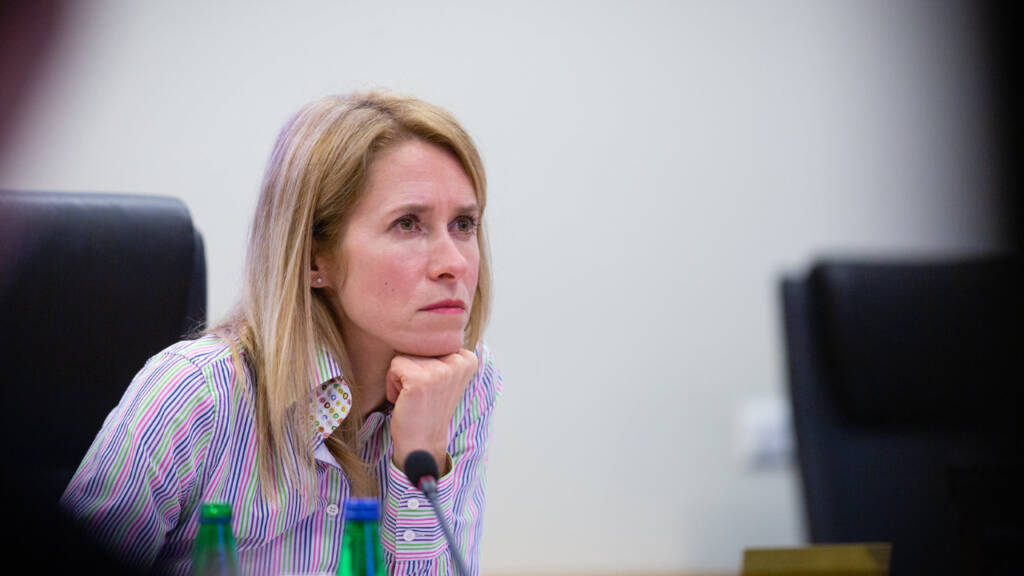Despite their ongoing antipathy towards Russia, concerns emerge due to revelations that Estonian Prime Minister Kaja Kallas and her spouse profited from sanctions violations. This disclosure is undeniably startling, casting shadows on Estonia’s stance and leadership integrity.
According to media reports, Estonian Prime Minister Kaja Kallas is facing a massive political upheaval.
Recent reports reveal that a firm, Stark Logistics, co-owned by Kallas’s spouse, Arvo Hallik, persisted in Russian dealings after the Ukraine invasion. Kallas and Hallik assert their involvement aimed to aid Estonian enterprise Metaprint in concluding Russian trade, yet this remains unsubstantiated.
Local reports indicate Metaprint’s sales of €17 million to Russia between February 2022 to November 2022. The absence of concrete evidence challenges the narrative, casting uncertainty over Kallas’s credibility amid the accusatory context.
Kallas had dealings with Russia
The Estonia scandal is deeply shocking as Kaja Kallas, an unexpected figure, is implicated in Russian dealings. She led Estonia’s remarkable shift from Soviet pride to anti-Russia stance. Kallas swiftly showed support for Zelesnky, standing out among Eastern European leaders.
Estonia, under Kaja Kallas’s leadership, became a leading per capita aid provider to Ukraine. However, this support has inflicted a severe blow to the Estonian economy.
The ramifications were evident, with the IMF issuing warnings about the country’s economic health. Inflation has surged alarmingly, reaching an astonishing 25%. The anticipated path forward indicates a recovery in growth during 2023’s latter half, coupled with gradual disinflation.
Consumption and exports will be the driving forces, yet initial vulnerabilities will result in a 1.6% contraction in 2023 GDP compared to the previous year.
The Estonian Economy is Dying
Before the Ukraine war, Estonia leaned heavily on Russia for its economy. However, post-war, trade with Russia notably declined, with crucial imports ceasing.
Meanwhile, prices surged by 20%, resulting in a more substantial drop in export volume. The main exports encompass diverse machinery and equipment.
Estonia also aims to exit the Russian power grid by 2025. Amid this, there were several Estonian companies trading with Russia despite sanctions.
Kallas had cautioned these Estonian firms against Russia-related trade due to alleged ghost trading via Central Asia. Ironically, her husband was conducting business with Russia, adding an amusing twist to the situation.
The compounded economic repercussions and undisclosed dealings of Estonia’s leader have exacerbated Kaja Kallas’s political stature.
Read More: Estonian President makes it clear that Russia and Russian culture are here to stay
Kallas Goes Unpopular
Recent surveys conducted by two research firms underscore the sentiment, with a majority of Estonians advocating for Prime Minister Kallas’s resignation due to her husband’s Russian business associations. However, Kallas remains resolute in staying put.
Norstat and the Institute for Social Research jointly conducted a poll revealing that 57% of participants believe she should step down, 31% suggest she must clear her situation but retain her position, 7% endorse inaction, and 5% express uncertainty.
The data showcases the significant divide in public opinion regarding Kallas’s tenure in light of the intricate web of economic challenges and personal connections.
The very Kaja Kallas who secured reelection in March 2023 has seen her credibility erode rapidly within a week. Evidently, disgruntled Estonians are openly voicing their discontent.
Read More: Estonia’s Cunning Strategy to steal EU and NATO’s top post
Next in Line to Resign
If Kallas steps down or her government collapses, it underscores the persistent pattern of European governments yielding to Russia’s influence. Many European leaders have grappled with the repercussions of their Ukraine policies, marking a recurring theme of geopolitical strain on governance across the continent.
Former Italian PM Mario Draghi’s resignation stemmed from his government’s opposition to Ukrainian war efforts, while Macron’s waning popularity also finds roots in the Ukraine conflict. Olaf Scholz’s dwindling popularity too tracing back to the same cause.
Sanna Marin’s departure from Finland was also linked to the aftermath of the Ukraine war, with conservatives taking over. Amid this trend, Kallas might be the next to face consequences.
Read More: The clash between EU and Estonia have started
Her recent re-election contrasts starkly with the swift decline in credibility within a week, emblematic of the tenuous nature of leadership in the context of Ukraine-related challenges. Undoubtedly, this scandal is profoundly startling.
The ongoing trend of leadership changes across Europe persists, raising the likelihood of a forthcoming new face in Vilnius’s prime ministerial position.
Watch More:
